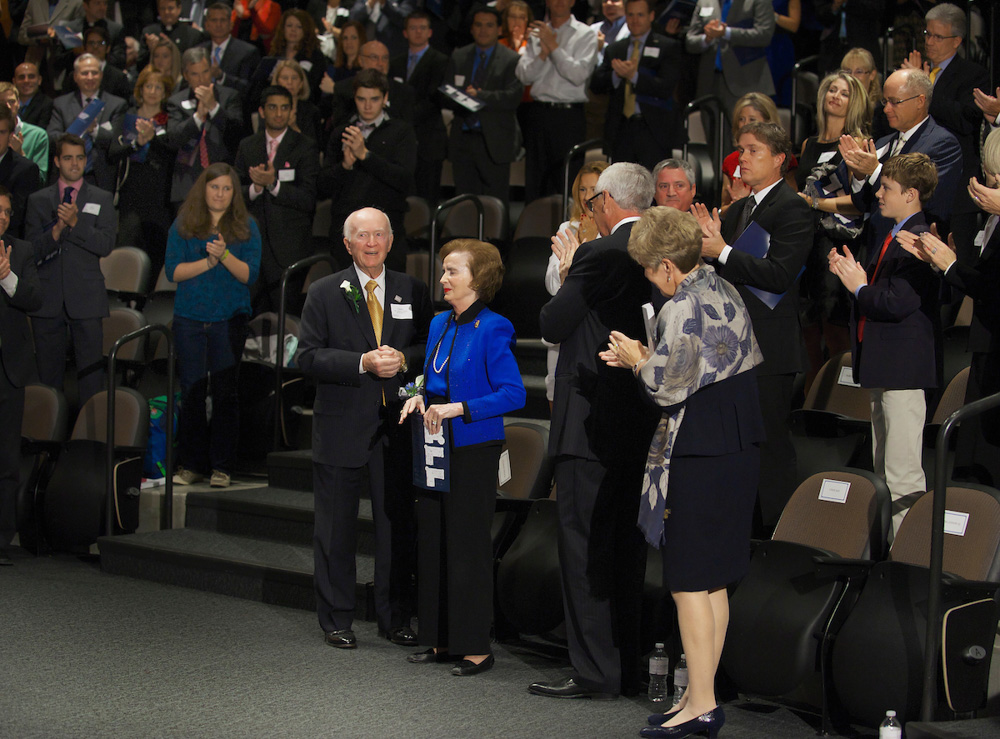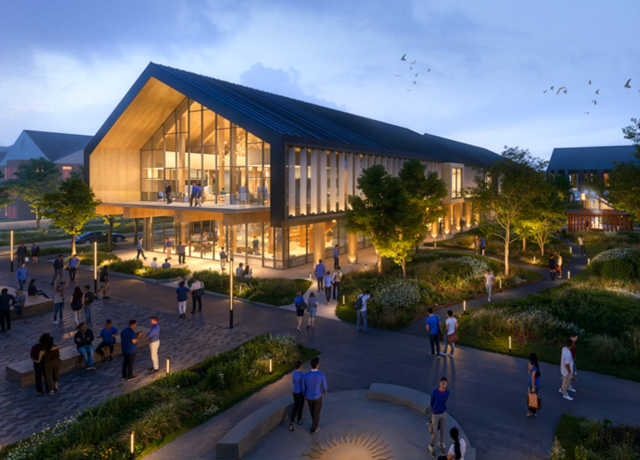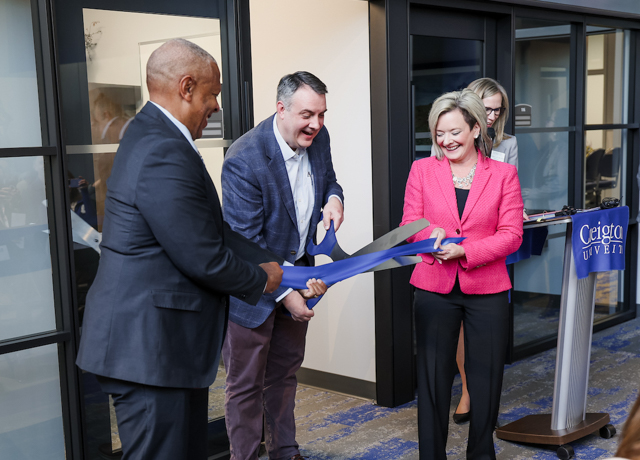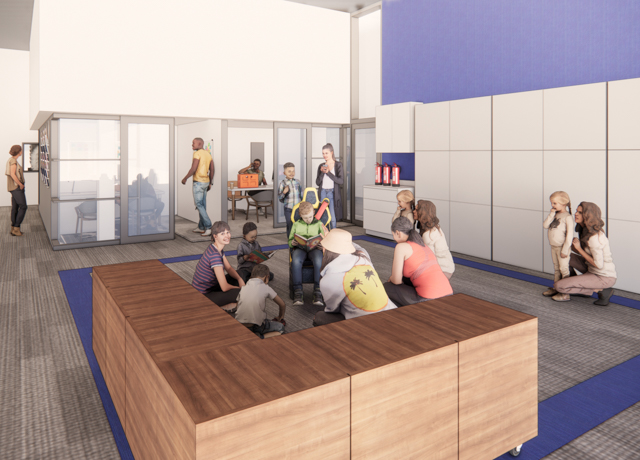Featured Testimonial About Creighton University
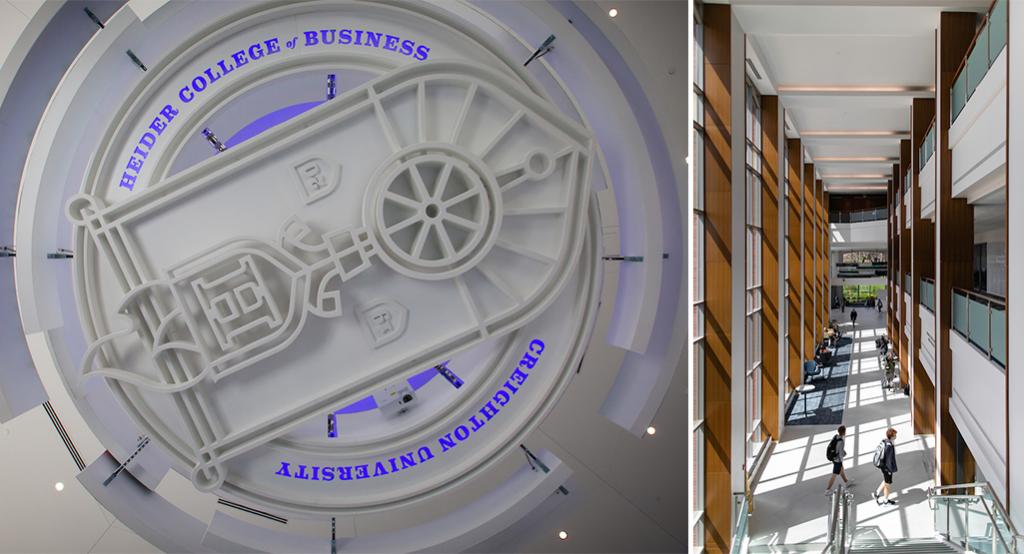
We cannot overstate how significant the naming of the Heider College of Business has been to Creighton University.
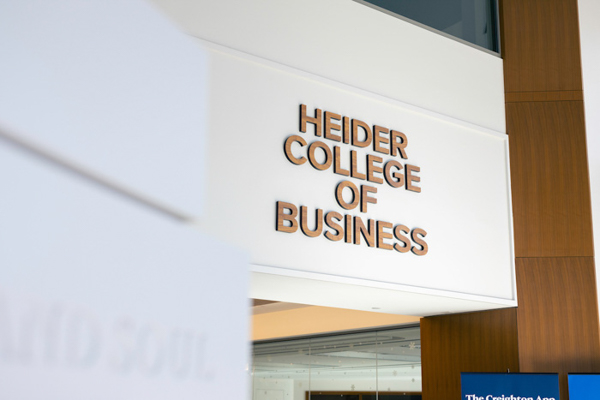
Ten years ago this month, Creighton’s business school kicked off one of the most significant decades in its long history — which began in 1920 with the opening of the College of Commerce, Accounts and Finance.
On Oct. 23, 2013, the College of Business became the Heider College of Business, Creighton’s first and (so far) only named school or college, embarking on a bold new era for Creighton business and the University itself.
The Heider College of Business — named after its donors, the late Charles “Charlie” F. Heider, BS’49, HON’10, and Mary C. Heider, HON’10 — was more than a name change.
It was a change of location, moving the business school from its longtime home in the Eppley Building into a reimagined Mike and Josie Harper Center.
It was a change of scale, with renewed efforts to increase the number of students, faculty, alumni and friends.
It was, ultimately, a change of mindset, an ambitious vision to take everything great about the Heider College of Business and do more of it. To make more connections with the business community, to adapt and innovate the curriculum to the ever-evolving world of business, to offer more opportunities for real-world experience. And to do all that without losing sight of the foundational Jesuit values that make Creighton, Creighton.
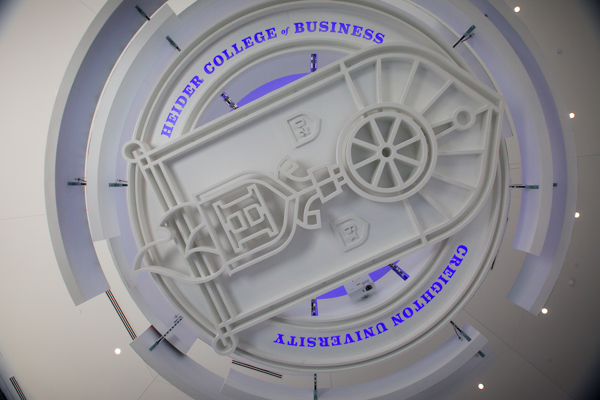
“We cannot overstate how significant the naming of the Heider College of Business has been to Creighton University,” says Creighton President the Rev. Daniel S. Hendrickson, SJ, PhD.
The Heider Family Foundation's continual investment in Creighton has opened the door to new possibilities for the college and University alike.
“Creighton’s partnership with the Heider Family," says Fr. Hendrickson, "has given us the resources to dream bigger, raise our reputation and do more for our students.”
In the past 10 years, Creighton's enrollment of business undergraduates has doubled. In 2012, 1 in every 10 undergraduates was a business student. Today, nearly 1 in every 3 is a Heider College of Business student.
The business school’s growth in size and scale has also meant growth in national stature and business partnerships, growth in talented faculty and experiential practicums and programs, and growth in the number of Jesuit-educated business graduates serving and working in our communities.
The growth extends beyond the Heider College of Business. The continual reimagining of the Harper Center has kicked off and aligned with a series of other campus enhancements — from a beautified 24th Street to an illuminated Creighton Hall to new health sciences buildings in Omaha and Phoenix, with much more to come.
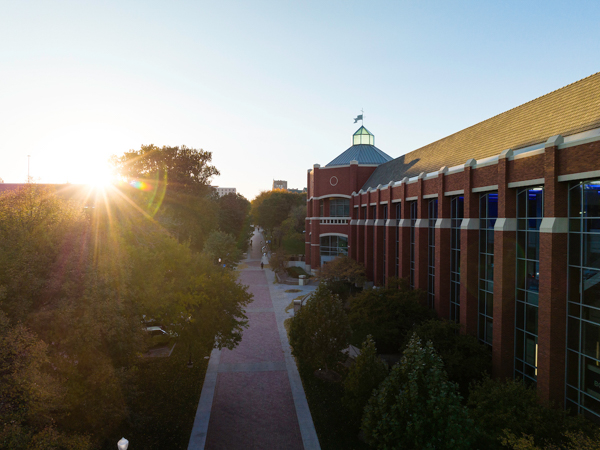
The naming of the business college launched a new mindset at Creighton, says Mary Chase, Vice Provost for Enrollment Management (the offices of which are in the Harper Center).
“It gave us room to take more risks. A decade ago, we weren’t innovating and challenging ourselves the way we are today, and the Heider College of Business has played a vital role in that.”
To celebrate the Heider College of Business' transformative success, we spoke with a group of University leaders, students and a member of the Heider family about what the naming of the College of Business has meant for Creighton and the community at large.
Starting up
Scott Heider, Managing Principal at Chartwell Capital, LLC, Creighton Board of Trustees member, trustee of the Heider Family Foundation: The origin of the named College of Business really starts with three men: Tony Hendrickson, Bruce Rohde, BSBA’71, JD’73, and my father, Charlie Heider. After Tony started as the business school's dean in 2005, they began talking about how the school could evolve.
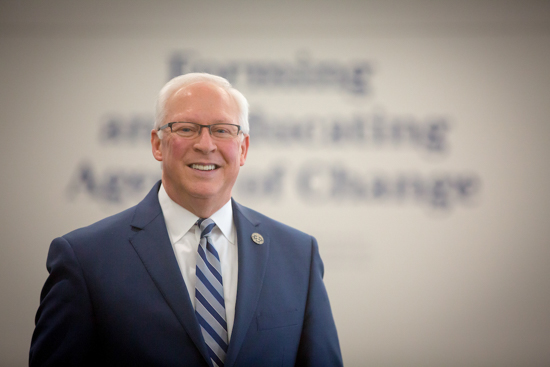
Tony Hendrickson, dean of the Heider College of Business: Charlie told me that back in his day, the late 1940s, the business school cut a bigger swath. In his day, the enrollment was 700 students.
Scott Heider: By 2012, there were fewer than 700 undergraduate business students.
Dean Hendrickson: Yet by 2012, we were a much bigger University, so the percentage of business students was lower — about 9% of our undergraduates were business students compared to the 25% enrollment at many Jesuit business schools.
Today, 1,200 business students account for 29% of all Creighton undergraduates.
Dean Hendrickson: Ten years ago, we were asking ourselves the obvious question: “Why did we have more business students 60 years prior than we do now?" We concluded that we had always just taken 150 freshmen every year, and that never changed for decades. Our next question was, "Should that change?"
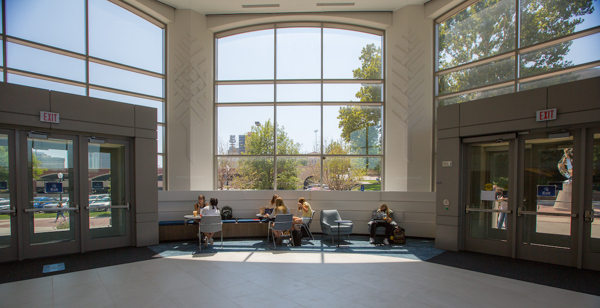
Scott Heider: By 2009, I hadn't been on the Creighton Board of Trustees very long when I got tapped on the shoulder by Bruce Rohde, who asked if I would be interested in having the Heider Family Foundation do something with the College of Business. I knew what Creighton University and the College of Business meant to my father, so there was no way I could say no.
Dean Hendrickson: At the time, the only academic building on campus east of 24th Street was the Ahmanson Law Center.
Scott Heider: The Mike and Josie Harper Center was brand new at the time, this gorgeous building, brick, pre-cast glass. And we realized that shifting the College of Business into that building instead of building a whole new one made a lot of sense. We raised the money to adapt the building to this new purpose, to shine a light on Creighton's College of Business like never before.
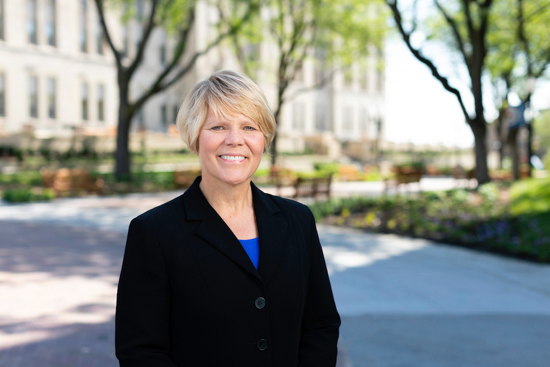
In a 2013 Creighton article, Charlie Heider said, “We have been advocates for a larger business school for years, and now is the right time to expand. A larger business school is good for Creighton University and good for our community.”
Scott Heider: When my father decided to put his name on the College of Business, our family clearly understood what a named college would mean to the University. It puts you in a different position nationally. It starts a different, more powerful conversation.
Mary Chase, Vice Provost for Enrollment Management: In the history of Creighton University, the naming of the Heider College of Business came during a critical moment when we needed to elevate, and it provided us an opportunity to do so.
Scott Heider: I'll never ever forget that night when we did the grand opening and showed everybody what we had done.
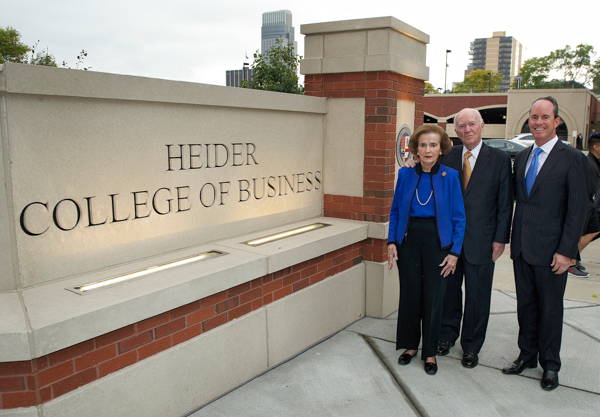
Mary Chase: We wouldn't be where we are today without the Heider family.
Scott Heider: I'd actually kept my mother and father away from the building for probably six months during construction because I didn't want them to see the renovations until they were complete. When they finally saw it for the first time, it was such a special moment for my mother and father, for the whole family. This was a true labor of love for me.
Mary Chase: In many ways, the Heider College of Business was a launchpad for so much that's happened over the past 10 years at Creighton. It raised the bar. It challenged the whole University to be better and strive for more.
“It's not about size. It's about scale.”
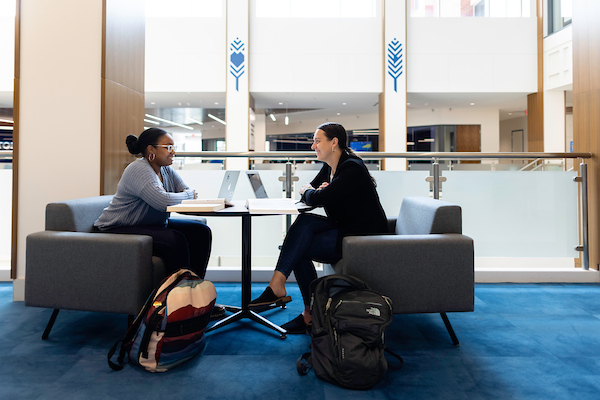
Dean Hendrickson: In 2012, we had about 650 undergraduate students in the College of Business.
Scott Heider: Today, there are more than 1,200 undergraduate students.
Dean Hendrickson: More than 10 years ago, when we were talking about how the business school could change, we knew that it's not about size. It's about scale.
Scott Heider: Once the college was named and moved into the Harper Center, that was really just the start of the great things to come.
Dean Hendrickson: When some places grow, the experience can become very different. Suddenly, you have twice as many people in a single class. You have more graduate students teaching classes. We had no intention of doing that.
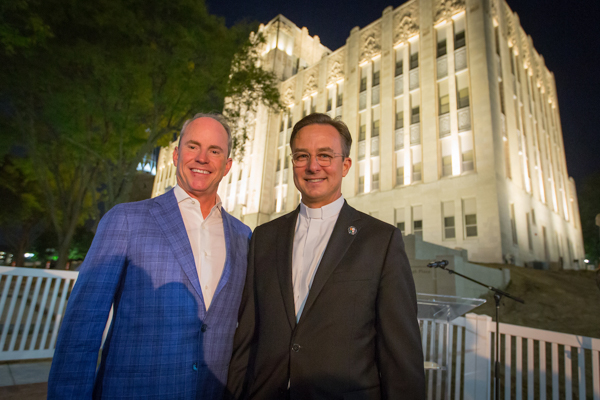
Rev. Daniel S. Hendrickson, SJ, PhD, Creighton president: The Heider College of Business has doubled its size over the past decade, but not at the expense of its quality of education.
Dean Hendrickson: It was important from the start to keep the same student-to-faculty ratio, 11-to-1. One faculty member for every 11 undergraduate business students.
Fr. Hendrickson: The growth couldn't dilute the experience.
Dean Hendrickson: We wanted to continue to offer this great education that Creighton business students were accustomed to, but with the resources and enhancements that come with a named college.
Scott Heider: Over the past decade, the College of Business has absolutely nailed the demand side of the equation that was out there for a Jesuit business education operating at this level. Over this period of enrollment growth, the academic profiles of the students also grew with the size of the college. That is impressive.

Fr. Hendrickson: We remain intensively focused on our students. We have maintained the excellence of our programs and innovated in whole new areas.
In 2019, for instance, the Heider College of Business became one of the first business schools in the U.S. to offer a FinTech (Finance and Technology) degree.
Dean Hendrickson: As with the growth of the University itself, we don't want to get bigger just to get bigger.
Fr. Hendrickson: The goal continues to be to move forward, boldly, while maintaining and embracing the excellence that defines a Creighton education.
A different kind of business school
Scott Heider: Seven or eight years ago, we would talk about Creighton's business college punching above its weight. We don't think that way anymore. We know today this school can compete with any other in the nation.
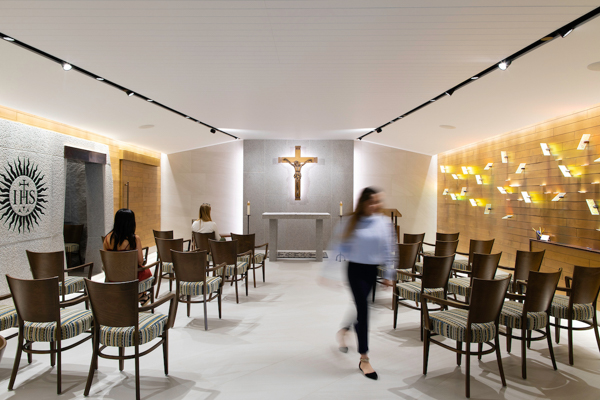
The Heider College of Business has been named among the top 2% of business schools in the world accredited in both business and accounting by the Association to Advance Collegiate Schools of Business (AACSB) International.
Scott Heider: The curriculum, the faculty, the programs, the community, the internships, the practical side of real-world experience — everything that's taken place within the reimagined four walls of the Heider College of Business has been fantastic and a true testament to the leadership of the Dean and dedicated faculty.
Dean Hendrickson: We've certainly raised our reputation in the last 10 years.
Scott Heider: And the ways Heider College of Business has excelled and raised its profile have been very consistent with the Jesuit philosophy, and that is very important to everyone.
Dean Hendrickson: With a named college, we've been able to do many things we couldn't have done otherwise. Such as putting the St. Peter Faber, SJ, Chapel in the building, which reemphasizes that we're a different kind of business school, one based upon our Jesuit values and our mission.

Mary Chase: When Tony Hendrickson thought about how he wanted to grow the Heider College of Business, it wasn't just adding students but adding students who wanted the things that make future business leaders successful. The Heider College of Business has continued to attract those students and provide them with such unique and practical programming and curriculum.
Fr. Hendrickson: Take, for instance, the business school's development of creative programming through the Heider Mindsets curriculum.
The Heider Mindsets foster the characteristics that businesses expect from recent graduates entering the workforce — intentional, analytical, collaborative individuals committed to service and working to make a better world.
Ophelie Koffi, Heider College of Business senior: Sometimes, the business world gets associated with bad connotations. But the Heider College of Business best incorporates Jesuit values, ethics and service into what we're learning.

Roland Onwona-Agyeman, Heider College of Business senior: Every other student I've come across in the Heider College of Business wants to not only be successful but see their peers be successful, too.
Ophelie Koffi: Of the qualities I've developed during my time at the Heider College of Business, the one I'm most proud of is empathy for helping others.
Roland Onwona-Agyeman: We push each other to be our best. It's one of those things where iron sharpens iron.
Ophelie Koffi I plan to go to law school after I graduate, and I know that whatever type of law I'm doing, I'm going to bring empathy and service of others to my career.
Roland Onwona-Agyeman: What I've learned here I'll take with me forever.
The Heider name
Dean Hendrickson: I have a picture of Charlie Heider that hangs over the desk in my office because his vision and who he was as a person continue to influence the direction the Heider College of Business takes today.
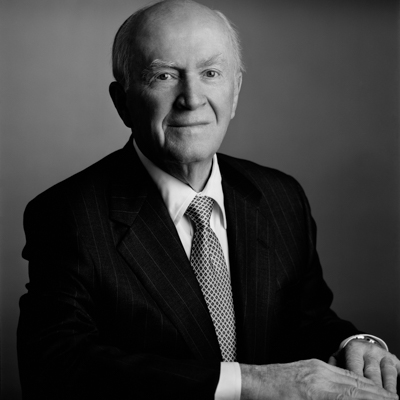
Scott Heider: My father always told me, “What's good for Creighton is good for Omaha.” I understand that today better than ever.
Dean Hendrickson: Charlie Heider just had this aura about him. He never had to lecture anyone about morality or doing the right thing. It was just the way he was as a human being, the way he carried himself.
In a 2013 World-Herald article, Warren Buffett said, “Charlie Heider has been an outstanding investor, a good friend of mine and a great supporter of Creighton — not a bad combination.”
Charlie Heider served as a go-between when Buffett purchased National Indemnity Co. in 1967, launching an insurance empire that later accounted for much of the wealth in Berkshire Hathaway’s investment pool.
Fr. Hendrickson: The Heiders' generosity has benefited Creighton in countless ways and strengthened our Jesuit, Catholic foundation, in the mold of our original founders, the Creighton family.
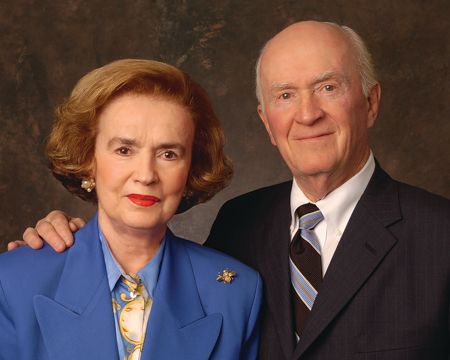
Dean Hendrickson: Of all the people I've met in Omaha over the past 19 years I've been here — and I've met thousands of them — I've never had one person tell me a negative thing about Charlie Heider. That says something.
Charlie Heider’s recognition includes receiving Creighton’s Alumni Achievement Citation (the University’s highest alumni honor) in 2003 and being named to the Omaha Business Hall of Fame in 2005.
Fr. Hendrickson: The Heider family's friendship with Creighton is very meaningful. It extends beyond business, and it extends beyond philanthropy.
Dean Hendrickson: The family this school is named after possesses the qualities we want our graduates to carry with them.
Mary Chase: The Heider College of Business in the Harper Center is a beautiful space, but what the Heider Family Foundation's support has meant for Creighton is about more than bricks and mortar. It’s about cultivating an experience that business students aren't going to find anywhere else and, through scholarships, offering greater access to students who yearn for such an experience.
Fr. Hendrickson: The Heider family has a deep regard and understanding of Jesuit spirituality and the intentional ways it can be applied to forming leaders in business.
Charlie Heider was named an honorary Jesuit in 1982 and received the Ignatius Leadership Award from the Jesuit Council of Omaha in 2002.
Scott Heider: Before my father passed away in 2015, he saw the business school move into the Harper Center. He saw the naming of the Heider College of Business. He saw enrollment start to grow, and he saw Tony Hendrickson's visionary enhancements throughout the business school. But the one thing my father didn't see, the one thing I wish he had seen, was Phase II.

Phase II
Scott Heider: Phase II is really everything you see when you enter the Heider College of Business today. The teaching, learning and studying environments have been completely reimagined. It’s a nationally recognized business school with a facility you won’t see anywhere else today.
Ophelie: Obviously, it's a beautiful building, but it's also just as functional. It's a hub for everything you need.
Scott Heider: Reimagined classrooms. Reimagined common areas. A totally reimagined experience for students, faculty and visitors. The building looks a lot different from the day we moved in 10 years ago.
Read more about and see more photos of the Phase II reimagining here.
Dean Hendrickson: We are always doing the things that make us continue to be the most connected business school in the nation. The renovations have helped solidify that.
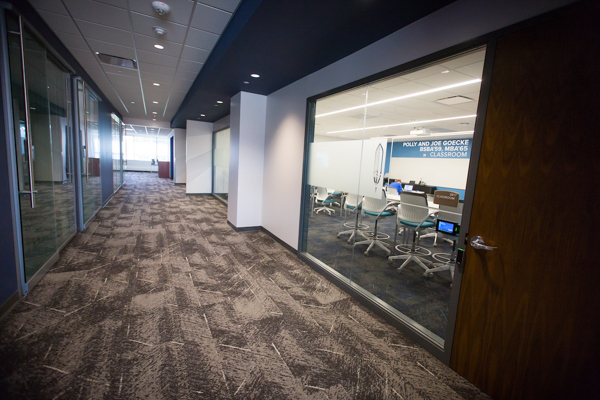
Scott Heider: When Phase II kicked off in 2018, we knew we wanted to create something collaborative. When you walk into the building today, you see huddle rooms and classrooms and meeting rooms through floor-to-ceiling glass. It’s what you would see today in most business environments, and that’s where our graduates are ultimately heading.
Dean Hendrickson: We knew we needed to make the building reflect what goes on the inside. With more than 70 huddle spaces, the Phase II design of the Heider College of Business enhanced a culture of transparency and collaboration between faculty and students.
Scott Heider: If you go into many corporations today, you're going to see spaces like this. We wanted to give students this environment before they even graduate, a space that would help them excel and work together and prepare them for the business world.
Dean Hendrickson: Things like the Faber Chapel display our Jesuit values front and center.
Scott Heider: After about a year into Phase II, we started noticing that a lot of the space was being occupied by students who weren't business students.
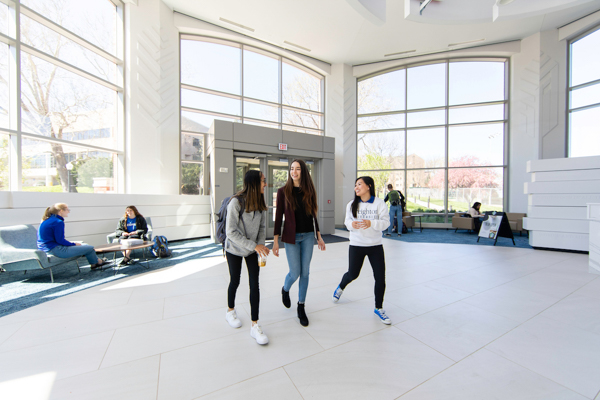
Roland Onwona-Agyeman: In the three years I've been a Heider College of Business student, there haven't been more than a few days where I haven't set foot in this building.
Scott Heider: Students from other schools and colleges wanted to come to the Harper Center and study. As opposed to saying, "No, we need to have this be for the College of Business only," we doubled down and ordered more furniture.
Roland Onwona-Agyeman: I never take this space for granted. No student should because we have one of the nicest business buildings in the country.
Scott Heider: Allowing the building to offer University-wide collaboration is just the right thing to do.
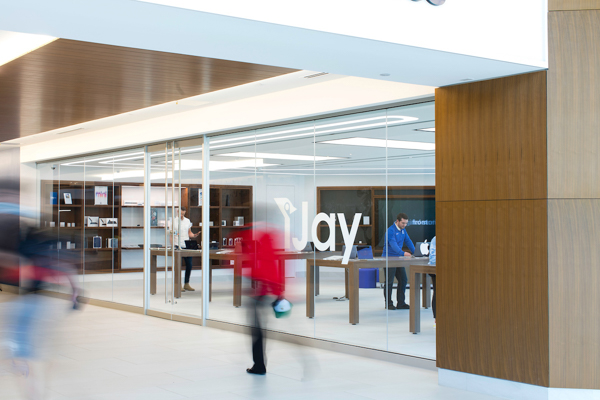
Mary Chase: There's a certain vibe with having businesses located within the Harper Center, with having a lot of students working collaboratively.
Dean Hendrickson: With the renovations, now we had space to run businesses, taking our iJay Store from a small place to a premier location on the main level. We have students running a store for Apple, the biggest brand in the world, and we have it right next to a Starbucks.
Creighton’s iJay Store is the first and one of only two student-run Apple-authorized campus stores in the world.
Dean Hendrickson: When you walk into the front entrance of the Harper Center and see this nerve center, as we like to call it, all these things come together for you to say: "Wow, now this is a business school."
The world's most connected business school
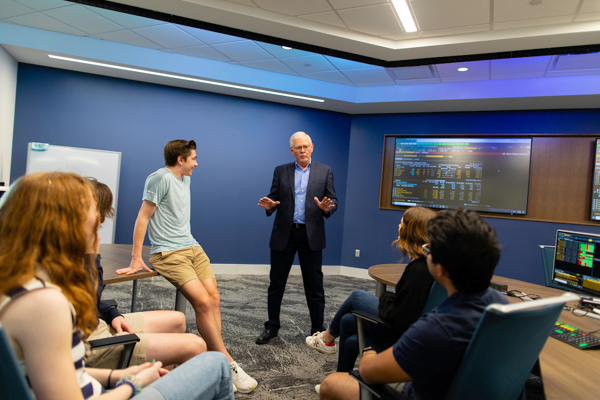
Dean Hendrickson: When I came to Creighton in 2005, we had professors who clearly connected with businesses. As we've grown as a college, and essentially doubled the size of the faculty, we've brought in more of them with those real-world connections.
Scott Heider: After the naming, the College of Business started recruiting faculty from all over the country. Incredibly talented faculty that bring a wealth of experience.
Dean Hendrickson: More than half of Heider College of Business faculty have started since 2013.
Scott Heider: The resumes of the candidates were extremely impressive. They had private-sector experience. They were coming from Disney and Intel and Johnson & Johnson, and now they wanted to be in the classroom, teaching a new generation of business leaders.
Fr. Hendrickson: They are bringing their real-world experience to the Heider College of Business.
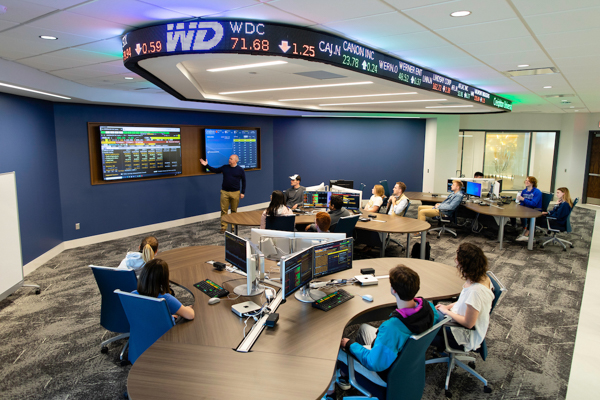
Mary Chase: They're also bringing their connections. I don't know of another place where you will find the intentionality of faculty using their experiences and research. In many cases, business professors are still functioning as high performers in the business community.
Scott Heider: Over the next few years, I would love to see the continued attraction of faculty and staff coming from all walks of life, from all over the country, bringing all kinds of knowledge that draws on the practical life experience of being in the business world. I think that's proven to resonate with the students.
Roland Onwona-Agyeman: Every assignment, every test and every unit I've learned in the Heider College of Business has a deep sense of meaning and purpose.
Ophelie Koffi: How our professors’ experience translates into their teaching makes an impression. It grounds what you're learning in the real world.
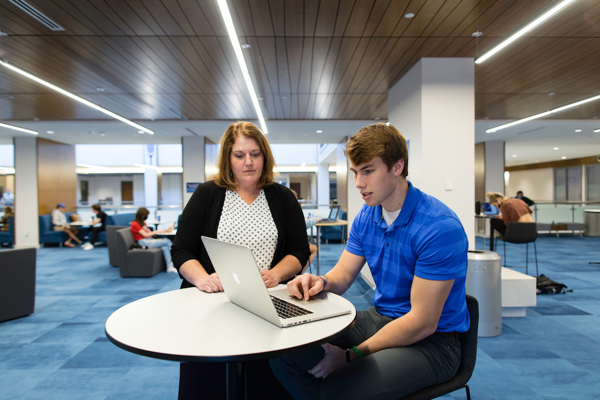
Roland Onwona-Agyeman: Our professors become our first connection to our future careers.
Fr. Hendrickson: The most significant element of the real-world experience is the portfolio of internship opportunities it brings for our students, in the Omaha business community but also nationally and internationally.
Dean Hendrickson: More than 90% of Heider College of Business undergraduates get internships before graduation. Many of them get multiple internships.
More than half of Creighton business students complete two or more internships.
Mary Chase: Of course, the real-world experience extends to what goes on in the building itself. There are several businesses right within the college. There’s the student-run Apple iJay Store and, across the way, a trading floor where a student investment team is investing millions of dollars of the Creighton endowment every day.
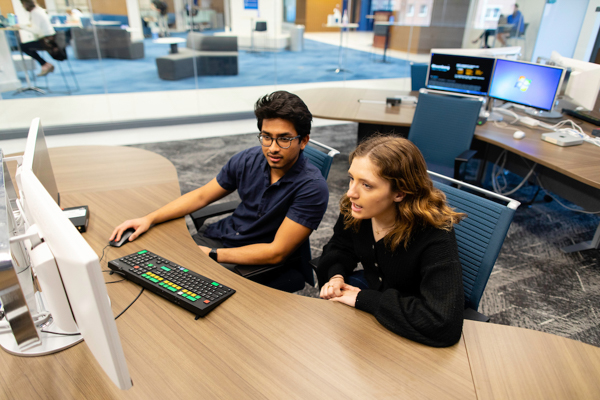
In the business school’s Portfolio Practicum class, nearly $10 million of University funds are managed by students.
Mary Chase: There’s also the J Blue marketing agency, and we can’t forget the student-run business analytics team that ESPN works with during the College World Series. The list of experiential learning opportunities is extensive.
Dean Hendrickson: Connections and opportunities like these come to fruition when you have the resources that come with a named college.
Mary Chase: Being the most connected business school in the world takes a lot of intention on multiple fronts.
- You bring the businesses into the business school.
- You have the faculty shape the curriculum through their practical experience.
- You prepare students to realize their potential in the real world because you know what the real world looks like.
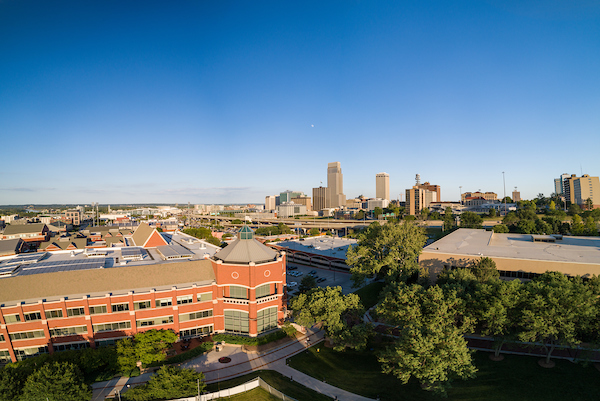
Mary Chase: That’s the brand, that's the message, that's what we talk about when we talk about the Heider College of Business.
The community
Mary Chase: With every new connection you make, you increase the size and impact of your community.
Scott Heider: I know my father would take a lot of pride in how Omaha has embraced Creighton University these past 10 years.
In a 2013 Creighton article, Charlie Heider said, “The vast majority of the talented young men and women who attend the College of Business come from all over the country. That is very impressive, and it also tells us something about the special opportunity we have going forward.”
Scott Heider: One of the most compelling facts about Creighton University is that 80% of the undergraduate students, including business students, come here from out of state, and more than half of them stay here to continue their education or take their first job here.

Fr. Hendrickson: The Heider College of Business has helped Creighton showcase its ability for powerful brain gain and retention.
Scott Heider: That's great for the University, of course, but it's also great for the community, especially the business community. Creighton’s graduates are changing Omaha.
Fr. Hendrickson: Our students help make the Omaha business community stronger.
Scott Heider: You're not going to find that level of attachment between a university and a city in many markets, especially bigger cities. No one is doing it like this community today.
Fr. Hendrickson: This partnership has been incredibly meaningful for everyone involved.
Ophelie Koffi: Not a lot of Creighton business students are actually from Omaha, but as someone who was raised here, it's been great to see how the business school and the city work together.
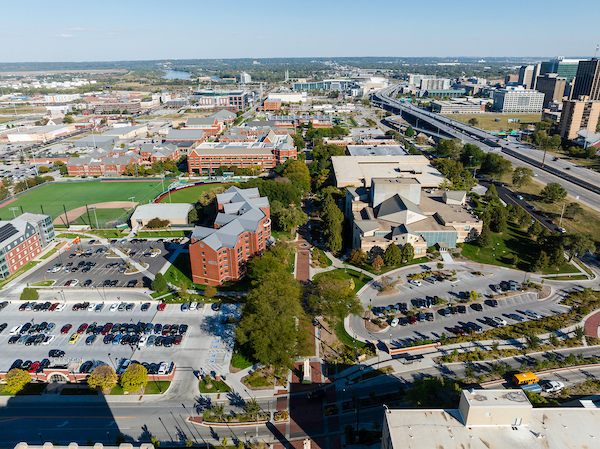
Scott Heider: This city is engaged with this University like never before.
Ophelie Koffi: I definitely hope to stay and work in Omaha after I'm done with school.
Scott Heider: This community loves Creighton business graduates. That's a good sign. The proof is in the pudding.
100% of recent Heider College of Business undergraduates are employed or enrolled in graduate school or a volunteer program within six months of graduation.
Scott Heider: Creighton's College of Business will continue to provide employers, both big and small, in Omaha, in Lincoln and in the region, with talented young minds through internships and at graduation time. The demand for the graduates is so impressive.
Dean Hendrickson: The growth of enrollment has also meant the growth of opportunities and the growth of the larger community.
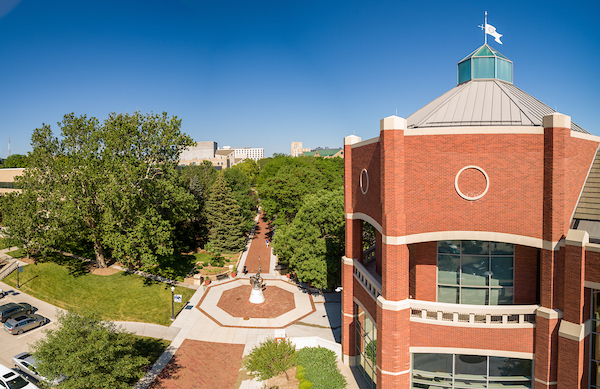
Fr. Hendrickson: When we talk about the Heider College of Business community, we are, of course, talking about the relationship with business communities local, national and international. We are also talking about the students, the alumni, the new faculty and staff, our donors, friends and community partners.
Dean Hendrickson: The best part has been the enthusiasm and pride that students have to be here and alumni's pride when they return —especially alumni who are proud to see that the excellent education they received continues to evolve and thrive.
“As a graduate of the college,” Charlie Heider said in a 2013 Creighton article, “I couldn’t be more pleased to be associated with one of the best business schools in our country, right here in Omaha.
The future
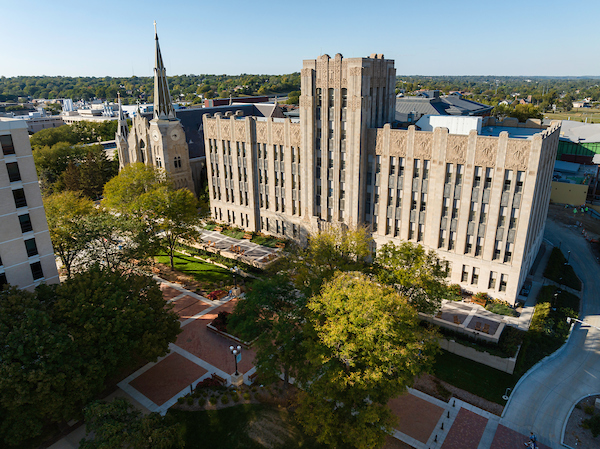
Dean Hendrickson: We want to continue to stress our strong connection with real-world business, as this is a strategic differentiator for us. We want to continue to partner with businesses to ensure our students are developing the knowledge and skills that will help them be great contributors to business and society.
Scott Heider: What was true in 2013 remains true in 2023 — the College of Business can continue to be an absolute catalyst for this University and this community.
Mary Chase: When you create momentum, momentum follows. Good things happen.
Scott Heider: There’s no Jesuit university in this country that’s been on the deliberate dead run that Creighton’s been on these past several years. I’m so excited for the University and the next few years because Daniel Hendrickson is a leader with vision.
Fr. Hendrickson: One of the many great things the Heider College of Business has done for us as a University is to show different ways to bring students together very effectively.
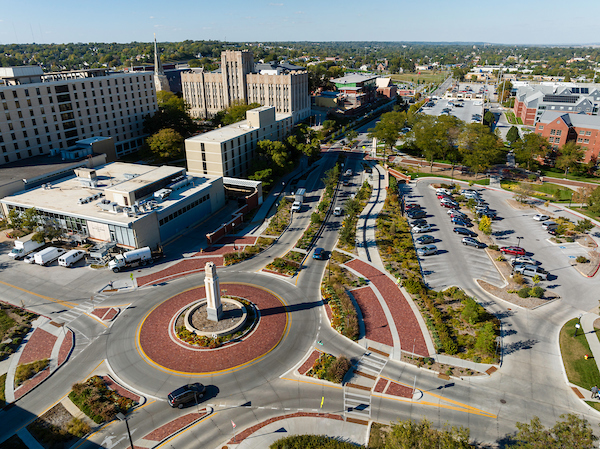
Scott Heider: I don’t think my father would recognize this campus today. And we’re only getting started.
Fr. Hendrickson: The development of the Harper Center and the Heider College of Business, from the initial reimagining through Phase II, started a wave of construction projects and campus enhancements supporting the academic enterprise and student recruitment with better living and learning spaces.
Scott Heider: Just look at everything that’s happened in the last several years. 24th Street has been reimagined into a boulevard. The University has shined a brighter light on Creighton Hall. There’s a new health sciences building in Phoenix and now on the Omaha campus. There’s a new freshman residence hall. A new Jesuit residence is on the way.
Mary Chase: The naming of the business college was the start of a new mindset at Creighton. It created a culture that encouraged innovation. The Jesuit mission and tradition have always kept us reflective and analytical, but the resources of a named college gave us the room to take more risks and to benefit from the rewards that came with them.
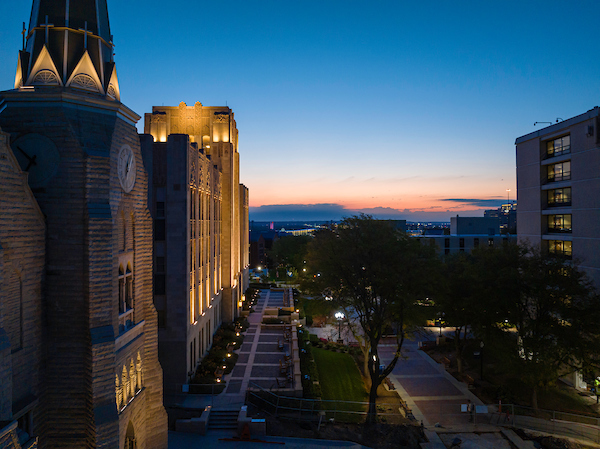
Fr. Hendrickson: In the 145 years of this University’s history, there have really only been a handful of periods that have seen this amount of growth and change.
Scott Heider: And I promise, Creighton is just getting started.
Fr. Hendrickson: This is a historic moment for the University.
Mary Chase: A decade ago, we weren’t innovating and challenging ourselves the way we are today, and the Heider College of Business has played a vital role in that.
Scott Heider: And our family is as interested as it’s ever been in supporting Creighton. We want nothing more than to shine a light on this University and its students and faculty.
“We are honored and grateful,” Charlie Heider said in 2013, “to be in a position to play a small part in the lasting impact this college will have on generations to come.”
